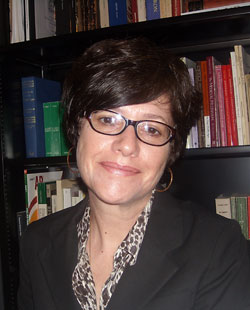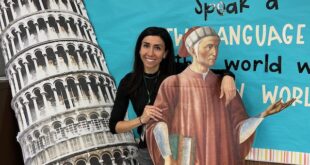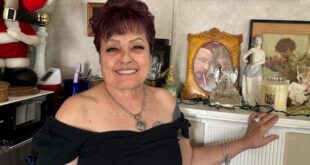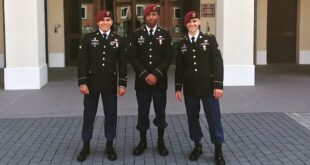
Tonia went on to doctorate studies at the University of Wisconsin and then taught Italian at Dominican University — all while raising a family. Today she goes by Tonia Bernardi Triggiano and her adjunct gig, which began in 1995, turned into a full-time position in 2006. This year, she received tenure, a remarkable accomplishment for any language professor.
“I teach all levels of Italian language, and all of our coursework incorporates culture,” Triggiano says. “I also teach literature — my specialization is in Medieval Italian literature — but since we’re a small department, we do it all. Right now we have a healthy cohort of students planning to major in Italian, but traditionally our classes are small.”
Triggiano has a rich Italian lineage — and stories of her own that sound ripe for a non-fiction book. Her parents immigrated to the United States from the Veneto region in 1948, and truly it’s a story of love in the face of fear. “My maternal grandfather, Domenico Martinello, was one of the founders of Radio Flyer, but returned to Italy and was influential in the Italian resistance,” Triggiano says. “And that’s how my parents met.” (Her father, Antonio Bernardi, was a partisan who left his Alpine unit in April 1944.)
But even with that fascinating history, it took an Italian poet to win her to her current vocation. While studying Italian as an undergraduate at Rosary College, Triggiano spent her junior year abroad in Florence. “I was introduced to Dante’s ‘Vita Nuova,’ and from that time I’ve been fascinated and humbled by Dante’s works.”
That explains why Triggiano sees the cultural dimension as vital to her work. “There is no substitute for love of culture, and I think this is what makes my teaching effective,” she says. “I want all my students to fall in love with Italy.”
To that end, Triggiano is involved with Dominican’s efforts to extend Italian learning beyond the classroom. The university has two study-abroad programs, one in Florence (four weeks in language and art) and one in Rome (10 days in art history). There’s also a student organization, CIAO, that leads events from espresso and biscotti sales to an annual St. Joseph’s Day mass and table.
Beyond the cultural highlights, it’s also about language as a communal phenomenon. Triggiano expects pupils to communicate in Italian with each other: “Although this is the most difficult task of language acquisition, it is the most meaningful capability,” she says.
She’s also returning to where things started, as she plans a two-semester course on Dante’s “Commedia” for 2013-’14. “My promise to students who enroll is that we will read every line and every word of Dante’s great poem,” she says.
Perhaps one of those students, so inspired, will follow in Triggiano’s footsteps.
 Fra Noi Embrace Your Inner Italian
Fra Noi Embrace Your Inner Italian






